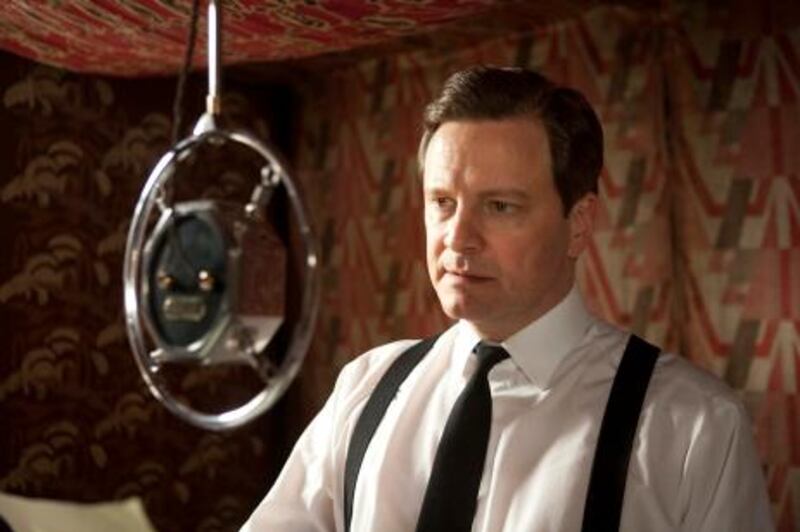It's become one of the most memorable film scenes of the year. As King George VI, played with Oscar-winning brilliance by Colin Firth, stands in front of a microphone (and his speech therapist Lionel Logue) to explain the 1939 declaration of war with Nazi Germany, the tension is palpable. Will he be able to get through his epochal speech without stammering, without appearing weak?
The King's Speech works both as a character study and a historical drama because, at that moment, the viewer is right there with George in that makeshift studio, sharing his unbearable pressure. It's great theatre. In fact, in 2012, it's likely to be theatre - with rumours surfacing this week that The King's Speech could hit Broadway and London's West End next year.
Such rumours, substantiated by the entertainment industry website Showbiz 411, aren't a complete surprise. The screenwriter David Seidler actually wrote an extended stage play alongside early versions of the screenplay to help him work out the relationships between the characters. That led to a proposal for a theatrical version of The King's Speech being delivered to Geoffrey Rush (superb as the therapist Logue), alerting him to the cinematic potential of the story, which he would go on to produce.
Finally, those who paid attention to the Oscars speeches in February might remember Tom Hooper's anecdote when he picked up the gong for Best Director. He told of an excited phone-call from his mother who had been to "a fringe theatre play reading of an unproduced, unrehearsed play called The King's Speech." She rushed home and said: "Tom, I think I've found your next film."
But it is strange that talk of an expensively assembled stage production should follow so quickly after the success of the movie. Of course, it's designed to capitalise on the success of the multiple Oscar-winning film while it's still fresh in our minds. But will an audience so familiar with the big-screen version really want to see it played out again on stage, unless some hitherto unexplored plot-lines are revealed? It's doubtful.
True, the film was in itself so theatrical that, come the end credits, people spontaneously burst into rounds of applause. The King's Speech will probably hang together as a night at the theatre. But that applause was not only for the fine directing, but, one sensed, the acclaimed performance of Firth. Any stage production would, essentially, be an inevitable competition between Firth and whoever took on the role of George VI. Good luck with that casting decision.
Adapting films for the stage is a strange beast at the best of times. Currently, Ghost is playing in the West End, but has been reimagined as a musical. Patrick Swayze and Demi Moore's performances in the 1990 movie made it one of the ultimate weepies of the late 20th century, but some of the passion of their intense love affair is undoubtedly diminished when the actors frequently have to burst into song. At least they kept the potters' wheel scene - and it helps that the film has the benefit of nostalgic goodwill, 21 years on.
But then, the most famous stage adaptations of recent years have seen fit to shoehorn songs into their plots - probably to make them seem fresh and different from their cinematic predecessors. And, admittedly, this has often worked. While the straight, song-free adaptation in 2004 of When Harry Met Sally was roundly derided (the Guardian critic Peter Bradshaw memorably describing it as "like a coach-party drive-in video rental"), Billy Elliot the Musical continues to wow audiences all over the world. There have been similar successes for The Producers (Mel Brooks's 1968 film, which was so successful on Broadway it was reshot as a musical starring Matthew Broderick in 2005), Legally Blonde and Hairspray.
Most of the time, however, there is a reasonable gap between the film and the stage production. The King's Speech will be turned around in fewer than 18 months - and without a song in sight. West End and Broadway theatres will probably be asking upwards of $100 (Dh367) for a couple of tickets, while the DVD is just $10. By that rationale, the adaptation seems like more of a gamble than perhaps the producers of the stage play have bargained for.
Still, perhaps there are circumstances in which we might queue for a ticket. The stage and film version of Frost/Nixon were made within a year of each other, and the same two main actors appeared in both: Michael Sheen as the television broadcaster David Frost and Frank Langella as President Richard Nixon. If the theatre producers of The King's Speech manage to pull off a similar coup and get Firth and Rush on board, it would be majestic, wouldn't it?





